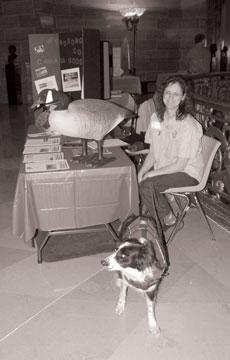Group believes bill is unrealistic

Anna (the dog) and Dorene Olson, owner and operator of Wynd Song. Wynd Song provides humane and effective solutions to conflicts with Canadian geese.
One Missouri group brings several groups to the Capitol building, but one issue stands out more than the rest.
The Missouri Coalition for Animal Legislation had its lobby day on April 10 in the third floor Rotunda.
Its groups represented everything from Dog Scouts of America and Wynd Song (border collies and Canada goose management) to animal rescue foundations and protecting abused and neglected animals.
But the bill that was on everyone’s mind was HB 46, “the horse impoundment bill.”
The bill would force law enforcement officials to call a state veterinarian whenever a case of abuse or neglect involved a farm animal of 50 pounds or more, which is why the coalition opposes the bill.
“We’re going to ask them to do something they can’t possibly do,” said Tim Rickey, director of rescue investigations for the humane society. “There are only nine state vets in Missouri and there are tens of thousands of farm animals in the state and hundreds of calls that come in every year.”
Currently, local veterinarians determine whether or not it is a case of neglect or abuse and the coalition is upset that law officials may have to go through one more strip of red tape for these cases.
“It would impose unnecessary suffering because it would take time for this process,” said Julie Leicht, executive director for the Missouri alliance for animal neglect.
Then, if it is proven that there was neglect or abuse, the animal will be quarantined and the owner will be forced to take care of it under the new law.
But Debbie Hill, vice president of operations for the humane society, said this isn’t realistic because if the owners didn’t care of the animals in the first place why would they start taking care of the animal after legal action was taken.
Currently, if an animal is proven to be neglected it is taken into custody and provided the care it needs.
Leicht said the policies currently in effect are sufficient and should not be changed.
“This bill will place animals in more danger,” said Hill.
The bill passed in the House and will most likely make it to committee in the Senate soon.
Your donation will support the student journalists of Missouri Southern State University. Your contribution will allow us to purchase equipment and cover our annual website hosting costs.



























